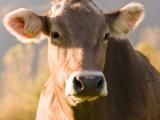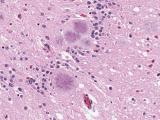Aug 9, 2002 (CIDRAP News) A Saskatchewan man who died earlier this summer was Canada's first victim of variant Creutzfeldt-Jakob disease (vCJD), but he probably acquired the disease in the United Kingdom, Canadian health officials announced yesterday.
Test results received from British experts this week confirmed earlier findings that the man had the first known case of vCJD in Canada, according to a news release from the Saskatchewan provincial government in Regina.
The man, whose name and hometown were not disclosed, probably contracted the disease while living and visiting in the UK in the 1980s and 1990s, said Dr. Ross Findlater, Saskatchewan's chief medical health officer. "It is highly unlikely that the case originated in Canada and just as unlikely that it was passed on to anyone in Canada," he said. "Based on our knowledge of this case, there is no reason to believe it is connected to Canadian livestock or the Canadian food supply."
Variant CJD is associated with eating beef from cattle infected with bovine spongiform encephalopathy (BSE), or mad cow disease. BSE was widespread in British cattle herds in the 1980s and early 1990s, and there have been 115 deaths due to definite or probable cases of vCJD, according to the UK Creutzfeldt-Jakob Disease Surveillance Unit in Edinburgh, Scotland.
One probable case of vCJD has been reported in the United States, in a female British citizen who was living in Florida when the case was announced last April. Officials said her case, too, was probably acquired in the UK. Her status was unclear at this writing; a telephone query to the Centers for Disease Control and Prevention was not answered in time. vCJD can be definitively diagnosed only by examination of brain tissue after death.
The then-suspected case of vCJD in the Saskatchewan man was reported to Canada's CJD Surveillance System last April, according to a Health Canada news release. The man, who was younger than 50, ate processed meat products while in the UK, and such products pose a high risk of BSE transmission if they come from infected cattle, Health Canada reported. The man ate very little beef after coming to Canada in the early 1990s, and he had not eaten deer or elk meat, according to the statement.
The man did not donate blood in Canada, but he did undergo a "medical procedure" that created a very slight risk of transmission of the disease to other patients through exposure to a device used in the procedure, officials said. Consequently, health officials were notifying people who were exposed to the device. The procedure was done before the man's diagnosis was suspected, according to Health Canada.
A report in the online edition of the Saskatoon, Sask., StarPhoenix said the procedure was an endoscopic examination conducted 4 months before the man died. The newspaper said the man died at St. Paul's Hospital in Saskatoon.
In the Saskatchewan news release, Dr. Steven Whitehead, deputy medical health officer for the Saskatoon region, noted that there is a theoretical risk that vCJD can be spread by medical equipment even after it has been thoroughly disinfected. "So out of an abundance of caution, Regional Health Authorty #6 . . . is contacting 71 people who may have been exposed to the same piece of equipment as the deceased while at the hospital," he said.
Whitehead called the risk of disease transmission "extremely minute," but said patients have a right to know about it. "Many of these patients have already been contacted, and we expect to reach the others in the next few days," he added.
Health Canada said the hospital has stopped using the devices that were used in the procedure on the vCJD patient. In addition, the hospital will advise patients who were exposed to the devices not to donate blood, organs, or tissues, the agency said. "However, if any of these individuals have donated blood since their procedure, their blood components that have not been pooled will be retrieved and destroyed. If any blood components donated by these individuals have been pooled, the theoretical and remote risk of CJD transmission does not merit further action," the statement said.
The agency said the victim's family members and healthcare providers are not at risk because vCJD is not spread through personal contact.
"Because the disease has a long incubation period, it was expected that a case of variant CJD would be diagnosed in Canada several years after a person acquired the disease while staying in the UK," the Health Canada statement said.
See also:
Saskatchewan government news release
http://www.gov.sk.ca/newsrel/2002/08/08-636.html
Health Canada news release
http://www.phac-aspc.gc.ca/cjd-mcj/vcjd-ca_e.html

















